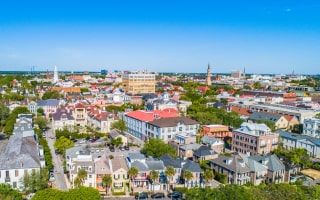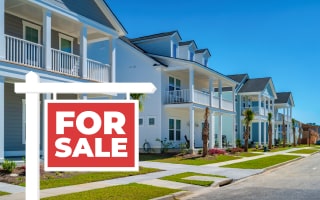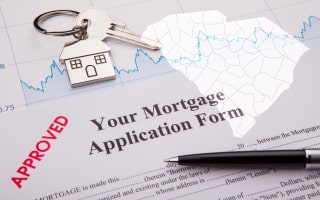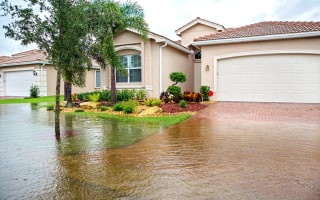Home Buying in South Carolina

South Carolina is a state of diverse living options, each with its own unique charm. Whether you're drawn to the slow, southern lifestyles of a charming town close to the Atlantic Coast or the vibrant energy of a growing city like Charleston or Greenville, the Palmetto State has something for everyone. Its warm climate, coastal beauty, and rich history make it a particularly attractive destination for families and retirees, offering a housing market as diverse as its landscapes.
South Carolina is celebrated for its low cost of living, historical landmarks, and friendly communities. However, homebuyers in the state should be mindful of challenges like fluctuating property taxes, increasing home prices in certain areas, and the potential impacts of severe weather, such as hurricanes and flooding.
The median home price in South Carolina is around $350,000, below the national average and roughly in line with most of its neighbors. South Carolina is largely considered a seller's market. Housing inventory continues to rise, resulting in less supply constraint. On average, homes in South Carolina stay on the market for about two months before they sell.
South Carolina has experienced significant housing market and population growth, especially in cities like Charleston, Columbia, and Myrtle Beach. In fact, the state has the highest inflow-to-outflow ratio among US states, meaning more people are moving in than are leaving. Out-of-state buyers are drawn to South Carolina's lower cost of living, pleasant climate, outdoor activities, and many job opportunities, especially in the healthcare and tech sectors. It also has a strong appeal for retirees seeking a more affordable lifestyle. Despite its affordability, growing demand has contributed to rising prices and competitive markets in key regions.
When buying a home in South Carolina, having the right guidance is crucial. You must organize your finances and consider essential decision-making factors such as location, lifestyle needs, and future growth potential. This is where a knowledgeable real estate professional, familiar with the state's diverse housing markets, comes in. From vibrant coastal cities to peaceful rural areas, they can guide you through the unique aspects of South Carolina real estate, ensuring you secure the ideal home and feel confident in your decision.
Understanding South Carolina Housing Trends
Having a firm grip on South Carolina housing trends is crucial for homebuyers in South Carolina.
Here are some statistics buyers should pay close attention to:
-
Median Home Prices
South Carolina's median home price is around $350,000, lower than the national average and significantly more affordable than many East Coast states. However, prices vary widely, with coastal areas like Charleston and Hilton Head seeing considerably higher median home prices. In Hilton Head, for example, the median home price is double that of the state median. Rural areas and smaller towns offer more affordable options. However, they often lack the proximity to major job centers many buyers look for when purchasing a home in South Carolina.
-
Number of Homes Sold
The South Carolina real estate market is active, with as many as 6,500 homes sold monthly, a number that often jumps in the spring and summer months. The state's economic and population growth has driven increased demand, making the market competitive in certain regions.
-
Median Days on Market (DOM)
The median DOM is the time a home stays on the market before it sells. In South Carolina, the median DOM is 60 days. However, homes in popular areas like Charleston, Greenville, and Myrtle Beach sell quickly, often within 30 days or less. In more rural or less populated areas, homes may stay on the market longer, giving buyers more time to negotiate.
-
South Carolina Housing Supply and Inventory
The average housing supply in South Carolina is four months. That means it would take up to four months to sell all of the housing stock in the state if no new homes come on the market. Since a five-to-six-month supply is needed for a balanced market, the state's housing supply is less constrained than in many other states nationwide. However, in rapidly growing areas like Charleston and Greenville, it is not uncommon for demand to outpace supply.
How to Find the Right Home in South Carolina

Working with a local real estate agent is crucial when buying a home in South Carolina. Whether you're a first-time buyer, relocating, or investing, a local agent can help you find a property that aligns with your lifestyle, budget, and goals. You and your agent must be in sync regarding your needs, aspirations, and financial situation. To make the most of your home search, make sure you have a clear understanding of what you're looking for and ensure open communication with your realtor, who can offer insights into South Carolina's diverse housing market.
Finding the Right Home
Here are some factors that will weigh heavily on your final decision:
Location
South Carolina offers a wide range of living environments, each with unique qualities. Ultimately, location will be one of the most important factors in your home-buying decision. That's because the location of your home will determine where your kids attend school, how long it takes you to get to work, and have an impact on your quality of life.
-
Urban vs. suburban vs. rural: Cities like Charleston, Columbia, and Greenville offer bustling urban environments with access to jobs, culture, and entertainment. Suburban areas such as Mount Pleasant and Simpsonville offer family-friendly neighborhoods with excellent schools and proximity to major cities. Rural regions like Aiken or the Lowcountry provide wide-open spaces and a strong sense of community where everyone approaches life a little more slowly.
-
Proximity to Work: Many homebuyers consider proximity to job centers an important factor when determining location. South Carolina's larger cities have growing industries in sectors like manufacturing, tech, and healthcare. Areas like the Upstate and Midlands are ideal for professionals seeking a blend of suburban and urban lifestyles, with easy access to employers and major highways.
-
Access to public transportation: South Carolina's public transportation is limited, with most residents relying on their vehicles to get where they need to go. However, some cities have good public transportation infrastructures, and commuter services are expanding throughout the state. Columbia, for example, has the COMET bus system, and Charleston residents rely on the CARTA bus system to get around the city.
-
School districts: School quality varies by district in South Carolina. Areas like Fort Mill and Lexington are known for their high-performing schools, making them popular among families. Research local school rankings when considering a home purchase.
-
Property Taxes: With an average rate of .46%, South Carolina's property tax rate is relatively low compared to other states. This is one of the many factors that continue to attract homebuyers into the state. However, property tax rates vary by county, so potential buyers should investigate local taxes when budgeting for their home purchase.
Type of Home
South Carolina's housing market offers a wide variety of home types to accommodate different buyer preferences, including:
-
Single-Family homes: Single-family homes are the most common home option across the state, available in both urban and suburban areas. Buyers can find everything from newly built homes to older, historic houses. These homes offer space, privacy, and the freedom to customize your property as you see fit. However, the routine maintenance costs of owning your home, above and beyond monthly mortgage payments, can sometimes put homeownership out of reach.
-
Condos and Townhomes: Condos and townhomes are popular in South Carolina's coastal areas and cities, especially among retirees and those seeking a low-maintenance lifestyle. Many of these properties offer great amenities like pools, fitness centers, and beach access. However, they do come with a monthly maintenance or association fee.
-
Historic Homes: South Carolina's rich history is reflected in its many historic homes, particularly in Charleston and Beaufort. While these are a great option for those seeking a single-family home with unique character, interested homebuyers must factor in any potential restoration or maintenance costs associated with owning a historic home.
-
Waterfront Properties: South Carolina has beautiful lakes, rivers, and coastal areas, making waterfront properties a popular choice for some homebuyers. This is especially true in and around Charleston, Lake Murray, and Hilton Head. However, home prices are often significantly higher in these areas, which are incredibly desirable.
The Home Buying Process in South Carolina
The home-buying process in South Carolina generally follows these steps:
- Get pre-approved for a mortgage.
- Hire a local real estate agent.
- Find and make an offer on a home.
- Schedule a home inspection and appraisal.
- Close on the property.
Financing Your Home Purchase

There are several ways to finance your South Carolina home purchase, from traditional mortgages to government-backed loan options. How you finance your home purchase will depend on your financial situation and the type of property you buy.
![]() Traditional Mortgages
Traditional Mortgages
In South Carolina, homebuyers typically choose from two types of traditional mortgages:
- Fixed-rate mortgages: Fixed-rate loans feature a constant interest rate for the life of the loan, making them a preferred option for homeowners seeking stability and predictable monthly payments.
- Adjustable-rate mortgages (ARMs): ARMs have interest rates that adjust periodically based on market conditions. While they often offer a lower initial interest rate, there is a risk of rising payments in the future as the rate fluctuates.
Leading lenders in South Carolina, such as South State Bank and First Citizens Bank, are commonly used by homebuyers to obtain traditional mortgages. These institutions offer competitive rates and personalized service, making them trusted choices among South Carolina homebuyers.
![]() Government-Backed Loans
Government-Backed Loans
Government-backed loans, which offer more flexible terms and lower down payments, can be a great option for qualified homebuyers in South Carolina.
Here are some options:
- South Carolina State Housing Finance & Development Authority (SC Housing) Loans: SC Housing offers affordable and consistent housing loans to qualifying homebuyers in the state.
- Federal Housing Administration (FHA) Loans: FHA loans, insured by the Federal Housing Administration, are ideal for buyers with lower credit scores or those who need a lower down payment.
- Veterans Assistance (VA) Loans: Available to veterans, active-duty military, and qualifying family members, VA loans often require no down payment and offer competitive interest rates.
- United States Department of Agriculture (USDA) Loans: USDA loans are designed for rural and semi-rural homebuyers. They offer low interest rates and no down payment requirements. Many areas in South Carolina qualify for these loans, making them a viable option for buyers in rural parts of the state.
![]() Down Payment Assistance Programs
Down Payment Assistance Programs
SC Housing and CommunityWorks are just two of the many down payment assistance programs available to South Carolina homebuyers. These programs aim to help reduce the upfront costs of purchasing a home. They are particularly helpful for first-time homebuyers or those needing financial support for down payments and closing costs. Exploring these options can make homeownership more affordable.
Home Insurance in South Carolina

The cost of home insurance, which mortgage lenders typically require as part of a loan package, continues to rise in the state, thanks to increased hurricane and flood risks. The state's average cost of home insurance is around $2,900, higher than the national average, though it may vary based on location and coverage needs. For example, South Carolina homeowners who require flood insurance, especially those in coastal and low-lying areas prone to flooding and hurricane damage, will likely receive higher insurance premiums than other parts of the state.
Challenges Within South Carolina's Housing Market
Despite the state's general affordability, South Carolina homebuyers face several challenges when entering the state's housing market, including:
-
Competitive coastal markets: Areas like Charleston and Hilton Head have become increasingly competitive, with rising prices and high property demand.
-
Weather-related risks: Hurricanes and flooding are common concerns for South Carolina homeowners. Buyers in coastal areas must seriously consider the cost of home insurance and potential storm damage.
-
Seasonal market fluctuations: As with many regions, the housing market is more active in the spring and summer months, with less activity in the fall and winter.
South Carolina Home Inspections
South Carolina has a pleasant climate but is subject to occasional thunderstorms, tornadoes, and hurricanes. Extreme weather can damage property, although it may not be obvious. That is why a South Carolina home inspection is critical before buying property there. A home inspection can help uncover these hidden issues and save the buyer thousands in repairs. If the inspector finds any problems, it can also give the buyer some negotiating power.
A home inspection in South Carolina includes the following items:
-
Structure: Foundation, walls, columns, chimney, crawlspaces.
-
Attic: Framing, sheathing, insulation, ventilation, electricity, HVAC, and ductwork.
-
Roof: Shingles, flashing, skylights, and gutters.
-
Garage: Doors, door opener, fire separation, walls/ceiling, slab, cabinets.
-
Plumbing: Supply line, main valve, pumps, water heaters, and fixtures (toilets, sinks, tubs, faucets, showers).
-
HVAC: Heating and cooling systems, ductwork, ventilation.
-
Electricity: Panels, circuit breakers, outlets, and fault breakers.
-
Interior: Walls, floors, doors, windows, doorbell, closets, ceilings.
-
Safety: Smoke detectors, carbon monoxide alarms, and fire sprinklers.
-
Exterior: Walkways, grading, drainage, driveway, and other property areas.
The price of a home inspection in South Carolina ranges between $300 and $500, depending on the home's size and additional services requested, such as mold, radon, and termite testing. A basic home inspection in Charleston costs roughly $300-$500.
The Process
The home inspection is part of the home-buying process, and the buyer pays for it. It is not an official closing cost but an optional service to ensure peace of mind before buying. The typical process is as follows:
- Find a reputable, local home inspector with whom they want to work.
- Schedule the home inspection at the right time.
- Show up and stay for the entire inspection. Ask questions as necessary. The complete inspection will take between two and four hours.
- Review the final report and decide where to go from there.
The Top Five Home Inspection Companies in South Carolina
- Home Inspection Carolina - Charlotte, SC
- Above and Beyond Home Inspections - Columbia, SC
- Charleston Home Inspection - Charleston, SC
- Integrity Property Inspections LLC - Columbia, SC
- A-Pro Rock Hill Home Inspection - Rock Hill, SC
After the Inspection
After the inspection, the inspector will submit a report to the buyer and other interested parties. The report will contain all the findings, including any issues that should be addressed before the sale closes. If the inspector finds serious issues, the buyer can take any of the actions below:
- Try to save some money by negotiating a better price.
- Ask the seller to make all the necessary repairs before closing.
- They can back out of the sale and walk away without losing any money.
- Ask for a home warranty.
- Request a lower down payment.
Inspection Top Cities
| City | Inspection Cost | Local Issues | Local Rules | Local Home Types |
|---|---|---|---|---|
| Home Inspection in Charleston | $350-$500 depending on the home's size, age, and extra tests. | Foundation cracks, roof leaks, and water damage. | No local rules. | Colonial, Georgian, Federal, Greek Revival, and Gothic Revival. |
| Home Inspection in Columbia | $300-$500 based on the size and age of the property. | Plumbing, roof damage, HVAC, drainage, and electrical issues. | Must be conducted in accordance with South Carolina building codes. | Southern Colonial, Craftsman Bungalows, Victorian, and Ranch homes. |
| Home Inspection in North Charleston | $325-$425 based on the square footage, crawlspace, and other factors. | Plumbing, drainage, poor ventilation, termites, and HVAC. | Not mandated. | Single-family homes, condos, townhouses, duplexes/triplexes. |
| Home Inspection in Mount Pleasant | $300-$500 based on the size of the house and year it was built. | Plumbing, roof, HVAC, electrical, deck, and termites. | No local rules. | Single-family homes, townhomes, and condos. |
| Home Inspection in Rock Hill | $315-$600. The cost for a house under 1,000 sq. ft. is only $375. | Plumbing, roof, foundation, clogged gutters, structural issues, and cracked drywall. | Must follow state rules. | Single-family homes, condos, townhomes, and multi-family properties. |
How to Navigate the South Carolina Housing Market
Buying a home in South Carolina presents a unique opportunity to enjoy the state's warm climate, beautiful landscapes, and rich history. Whether you're drawn to bustling cities, charming coastal towns, or quiet rural areas, the Palmetto State offers diverse housing options for every lifestyle and affordable living costs not found in many other states along the East Coast.
Homebuyers must stay informed about current trends and challenges as the South Carolina housing market grows, particularly in popular areas like Charleston, Greenville, and Columbia. Research and working closely with a knowledgeable real estate agent are keys to success.
By working with a local realtor, understanding the financial options available, and being prepared for potential risks like weather-related hazards, you can confidently navigate the process and secure the home of your dreams in South Carolina.
Home Buying Guide
- Home Buying in South Carolina
- Understanding South Carolina Housing Trends
- How to Find the Right Home in South Carolina
- Financing Your Home Purchase
- Home Insurance in South Carolina
- Challenges Within South Carolina's Housing Market
- South Carolina Home Inspections
- How to Navigate the South Carolina Housing Market
Instant Access to South Carolina Property Records
- Owner(s)
- Deed Records
- Loans & Liens
- Values
- Taxes
- Building Permits
- Purchase History
- Property Details
- And More!
Home Buying Guide
- Home Buying in South Carolina
- Understanding South Carolina Housing Trends
- How to Find the Right Home in South Carolina
- Financing Your Home Purchase
- Home Insurance in South Carolina
- Challenges Within South Carolina's Housing Market
- South Carolina Home Inspections
- How to Navigate the South Carolina Housing Market